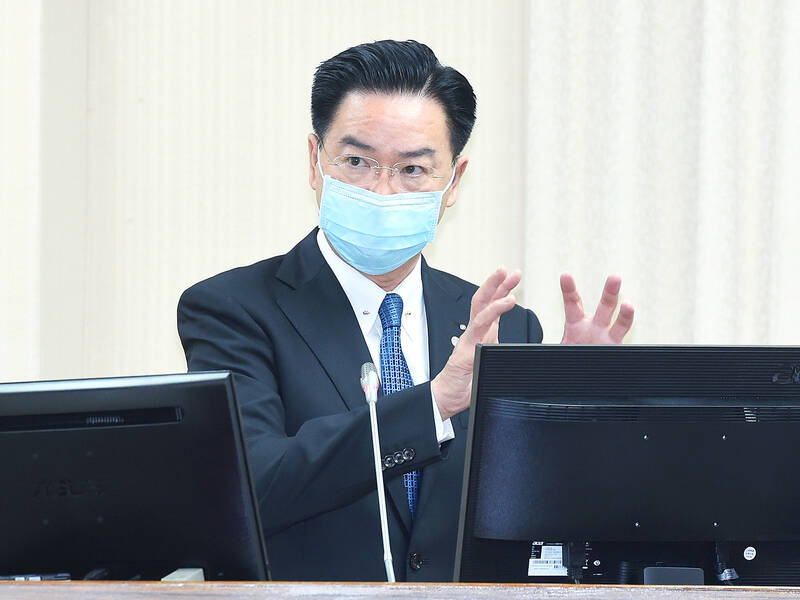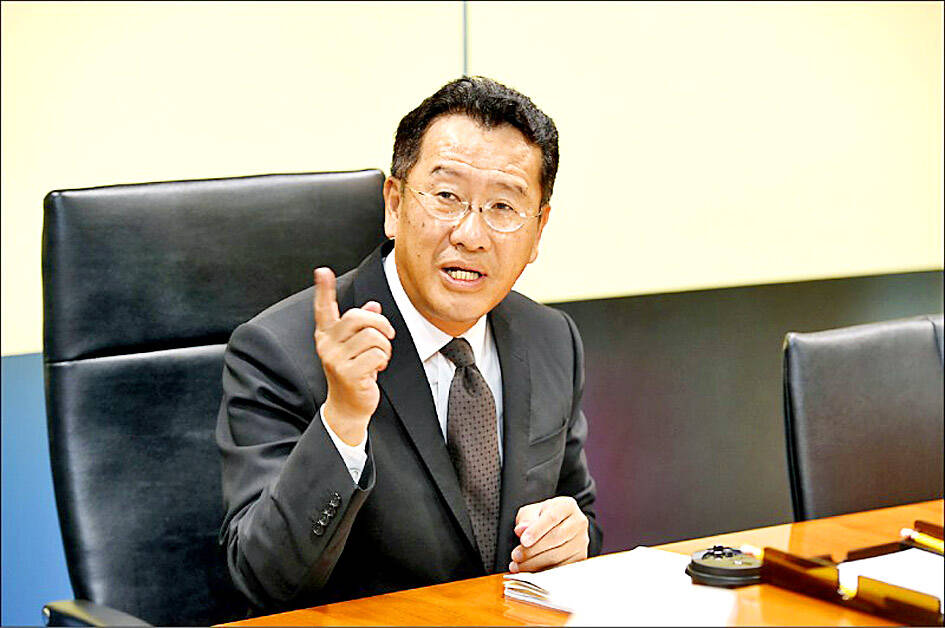China is likely to ramp up its diplomatic “attacks” on Taiwan following the Chinese Communist Party’s (CCP) National Congress last week, including trying to snatch more of the nation’s few remaining diplomatic allies, Minister of Foreign Affairs Joseph Wu (吳釗燮) said yesterday.
The CCP wrapped up its congress on Saturday, cementing Chinese President Xi Jinping’s (習近平) grip on power.
In a report to the legislature, Wu said he expected Beijing to ramp up its “security threat and diplomatic suppression” of Taiwan.

Photo: Liao Chen-huei, Taipei Times
“China is likely to increase its attacks and threats to Taiwan, especially in the diplomatic field,” Wu told lawmakers. “This is what we are worried about.”
Taiwan has received “signs” and intelligence from unspecified diplomatic allies that China is boosting efforts to lure the nation’s allies into switching official recognition to Beijing, he said.
“The diplomatic challenges we are facing are getting bigger,” he said. “Looking forward, our situation is becoming more difficult.”

Photo: Lee Hsin-fang, Taipei Times
Under Wu’s time in office, six countries have switched official recognition from Taipei to Beijing.
Separately, National Security Council Secretary-General Wellington Koo (顧立雄) said there are no signs that China is planning an attack on Taiwan next year, and urged Western nations to send a clear message that they would intervene if China launches a military operation against Taiwan.
Analysts’ estimates for when China would develop the ability to invade Taiwan have shortened from 2027 to 2025 and now as soon as next year.
National Security Bureau Director-General Chen Ming-tong (陳明通) last week said that if an attack occurs next year, its aim would be to force Taiwan to the negotiating table.
Speaking to political commentator Wang Shi-chi (王時齊) on her Yahoo TV show, Koo yesterday said there are no indications that military action is imminent, although it is prudent to analyze all scenarios.
China is facing mounting domestic problems, from economic decline and rising unemployment, to its “zero COVID-19” policy and US technology embargo, he said.
Beijing would continue to threaten Taiwan, but there are no warning signs of an invasion, even though it has been making preparations, he added.
Taiwan must approach the uncertainty of the next five to 10 years carefully, using a sense of worry to improve defense capabilities among the military and public “to let China know we will not give in,” Koo said.
China might have numbers on its side, but with the right weapons, Taiwan could weaken China’s willingness to invade by withstanding the first strike to launch a bruising counterattack, he said.
Meanwhile, the US and other Western countries should send a clear message to China that as soon as it makes military overtures toward Taiwan, they “would not preclude the possibility of involvement,” he said.
Asked if this is a tacit agreement between Taiwan and Western countries, Koo said that from the council’s perspective, the possibility of “intervention” cannot be ruled out.
China must first stabilize its domestic issues, Koo said, adding that he does not foresee Beijing rushing to deal with Taiwan “for at least the next two to three years.”
From a geopolitical perspective, Taiwan is on the forefront of the first island chain, meaning that an invasion would be felt much further afield, he said.
With Japan, South Korea and the Philippines all to be affected, “where would the US retreat to? Not just Guam, maybe even Hawaii,” he added.

SECURITY: As China is ‘reshaping’ Hong Kong’s population, Taiwan must raise the eligibility threshold for applications from Hong Kongers, Chiu Chui-cheng said When Hong Kong and Macau citizens apply for residency in Taiwan, it would be under a new category that includes a “national security observation period,” Mainland Affairs Council (MAC) Minister Chiu Chui-cheng (邱垂正) said yesterday. President William Lai (賴清德) on March 13 announced 17 strategies to counter China’s aggression toward Taiwan, including incorporating national security considerations into the review process for residency applications from Hong Kong and Macau citizens. The situation in Hong Kong is constantly changing, Chiu said to media yesterday on the sidelines of the Taipei Technology Run hosted by the Taipei Neihu Technology Park Development Association. With

CARROT AND STICK: While unrelenting in its military threats, China attracted nearly 40,000 Taiwanese to over 400 business events last year Nearly 40,000 Taiwanese last year joined industry events in China, such as conferences and trade fairs, supported by the Chinese government, a study showed yesterday, as Beijing ramps up a charm offensive toward Taipei alongside military pressure. China has long taken a carrot-and-stick approach to Taiwan, threatening it with the prospect of military action while reaching out to those it believes are amenable to Beijing’s point of view. Taiwanese security officials are wary of what they see as Beijing’s influence campaigns to sway public opinion after Taipei and Beijing gradually resumed travel links halted by the COVID-19 pandemic, but the scale of

A US Marine Corps regiment equipped with Naval Strike Missiles (NSM) is set to participate in the upcoming Balikatan 25 exercise in the Luzon Strait, marking the system’s first-ever deployment in the Philippines. US and Philippine officials have separately confirmed that the Navy Marine Expeditionary Ship Interdiction System (NMESIS) — the mobile launch platform for the Naval Strike Missile — would take part in the joint exercise. The missiles are being deployed to “a strategic first island chain chokepoint” in the waters between Taiwan proper and the Philippines, US-based Naval News reported. “The Luzon Strait and Bashi Channel represent a critical access

Pope Francis is be laid to rest on Saturday after lying in state for three days in St Peter’s Basilica, where the faithful are expected to flock to pay their respects to history’s first Latin American pontiff. The cardinals met yesterday in the Vatican’s synod hall to chart the next steps before a conclave begins to choose Francis’ successor, as condolences poured in from around the world. According to current norms, the conclave must begin between May 5 and 10. The cardinals set the funeral for Saturday at 10am in St Peter’s Square, to be celebrated by the dean of the College